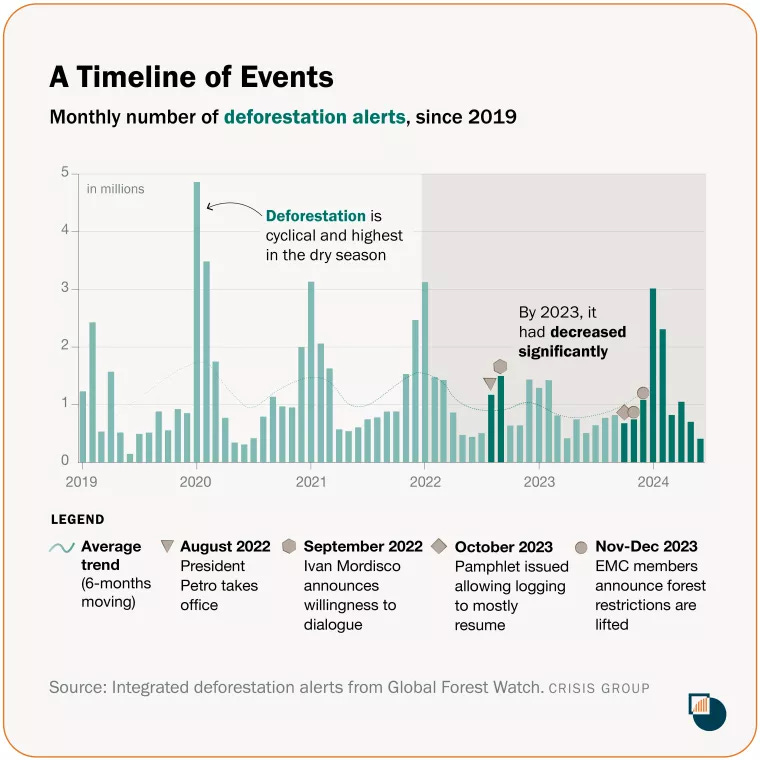Colombian rebel group accesses funds meant to protect rainforests
New report shines light on the depth of EMC influence in the Amazon as deforestation rates are again on the rise
Gustavo Petro, the first leftist president in Colombia in at least 50 years, made rainforest preservation and clean energy key planks of his election campaign. And for a time, he made progress on both.
New oil exploration was halted in Colombia, though already existing contracts are being honored, and Ecopetrol, the state-owned oil company, was ordered to invest heavily in alternative energy production and research.
Despite popular protests, Petro’s government has also rolled back gasoline subsidies, and deforestation in 2023 reached its lowest level in 23 years, particularly in the Amazon, where conservation efforts are focused.
However, some of those gains in deforestation were the result of rebel groups, who controlled broad swaths of the Amazon rainforest in a country where there was little state presence. At the time, those groups sought the good graces of the administration ahead of Petro’s “Total Peace” plans, which involve direct talks with criminal armed groups.
As formal talks with those groups collapse, however, deforestation in their territories is exploding, and based on the first 6 months of 2024, the total area of rainforest cleared is likely to exceed 2021 figures— effectively erasing all gains made by Petro’s administration.
In late 2023, investigations (some conducted by your very own PWS crew) began to reveal that criminal armed groups were as fundamental a factor in declining land clearance as government programs.
A new report from think tank the International Crisis Group (ICC) shows that those same criminal groups, who have since left formal negotiations with the government, may now be the biggest obstacle to Petro’s environmental plans.
Estado Mayor Central (EMC) was formed in 2016 from fighters who rejected a peace deal between the government and rebel group the Revolutionary Armed Forces of Colombia (FARC).
EMC established a strong presence in formerly FARC controlled areas after the rebel group disarmed en masse, and quickly expanded into other regions of the country as well. They are currently the dominant group in most of Colombia’s Amazon regions— roughly 40% of the country.
They have long profited from illegal economies in those regions including coca production, illegal mining, extortion, clearing forestlands in protected areas for cattle ranching, illegal timber production, and schemes that allow them to acquire and sell land titles within the Amazon.
They have even, according to ICC, managed to gain access to funds meant to protest t the very forests EMC now controls, via carbon-credit funds from both countries and the private sector.
EMC pressured and convinced indigenous communities to apply for funds as stewards of the Amazon rainforest in protected national park regions, and even did all the paperwork for them— in return for a percentage of the payments.
And even as they collect those funds, they build illegal roads into protected parklands to facilitate the construction of unlicensed businesses such as ranching, mining, and coca cultivation.
In September 2022, a month after Petro took office, EMC, led by ex-FARC commander Ivan Mordisco, called for the total suspension of logging “until an institutional solution for the rural poor who lack economic inclusion and land opportunities arise for them in these four years under the government of Dr. Gustavo Petro.”
According to experts, EMC’s sudden interest in rainforest conservation was a display of power, and a strategy to improve their position at the negotiating table with government representatives. Now with talks scuttled, and major military operations against EMC ongoing, that dynamic has reversed.

Last year, as deforestation rates declined, PWS spoke with Bram Ebus, an investigator and consultant for ICC, who offered an ominous warning about the truth behind the trend.
“Protection of rainforests, which are incredibly valuable not only for their diversity but are also one of the biggest carbon sinks in the world,” said Ebus, “cannot be outsourced to non-state actors.”
Now, after a series of devastating setbacks to Petro’s “Total Peace” plans, he finds his successes in combating deforestation threatened as well. The programs have been one of his administration’s few successes and the timing for Petro couldn’t be worse.
This week Colombia hosts the international COP16 conference on biodiversity in Cali. The event will be attended by dignitaries, journalists, think tanks and U.N representatives from around the world and will be focused on conservation efforts combined with peacebuilding.
EMC meanwhile, which controls municipalities just thirty minutes by highway from Cali, has offered veiled threats about the conference, urging that foreign leaders “refrain from attending”.
PWS is on the ground in Cali, covering COP16, and can report firsthand that the state response to these threats has been overwhelming. Military and police patrol the streets, and armored personnel carriers are parked just a few blocks from the area where the conference is to be held.
Militarization in response to conflict in Colombia, it seems, has become a point of agreement between both left and right-wing presidents in the country.
The Big Headlines in LATAM
Bolivia’s head prosecutor said this week she would issue an arrest warrant for ex-president Evo Morales for alleged statutory rape and human trafficking- charges which Morales denies.
The announcement triggered days of protests in the country as Morales supporters set up roadblocks and at times clashed with police.
The charges are not new. They stem from 2020 while Morales was in exile after being ousted from power after trying to run for an unconstitutional third term in office. The right-wing government that replaced him filed a criminal complaint shortly after he fled the country alleging a sexual relationship with a minor in 2015, and that he had taken her on trips abroad, actions which they said amounted to human trafficking. The same government filed charges against him of treason and sedition— charges that were later dropped after courts ruled due process was not followed by prosecutors.
Morales has argued the charges are politically motivated.
Morales is in a bitter power struggle with Luis Arce, the current Bolivian president, to control the leftist party MAS, which has split as the two vie for official leadership.
Bolivian police say they will honor the arrest warrant if it is issued.
Cuba is reeling from nationwide blackouts as an ongoing energy crisis continues to worsen. Residents blame decaying infrastructure and ongoing fuel shortages. Venezuelan imports of oil, which Cuba depends on for domestic energy needs, have decreased in recent months as Venezuela battles shortages of its own.
Cuba’s President Miguel Diaz-Canel blamed the US for “financial and energy persecution,” which he said had made it “difficult to import fuel and other necessary resources.”
Hurricane Milton also disrupted fuel deliveries from Russia and China, exacerbating the ongoing problem.
Former One Direction member Liam Payn fell from a balcony and died in Buenos Aires, Argentina on Oct 17. Our colleagues over at the Buenos Aires Herald broke the story in English as well as new details about the circumstances of his death.
The actor was seen arguing with two women in the hotel shortly before his fall, with witnesses saying the women were complaining he refused to pay them— though for what is unclear.
Police have released no evidence that his death was intentional and are investigating alleged drug use in the case.
Ship’s Log
Joshua is in Cali, Colombia, for COP16. If he doesn’t get blown up, Joshua will be doing stories for some media companies, as well as working on a podcast here at PWS. In any case, he is looking forward to the trip and may spend some time in northern Cauca after the conference wraps up.
We’re working on a podcast episode about the event, to be released for paid subscribers here. Out soon!
Spanish Word of the Week
The remarkable diversity of the word “mango” in Cuban slang:
In Cuba, if something is extreme or too hot to handle, you can say “it snores the mango”. A clusterfuck or a shitshow is “rice with mango”.
A very attractive person is “a tremendous mango”.
And if someone says something impossible to believe, you can say that their words “fling the mango”.
Cubans spend a lot of time thinking about mangos! But, to be fair, so does the crew at PWS. Our official position on the subject is that mangos are amazing.




Very comprehensive article once more, Joshua. Thanks. MPK